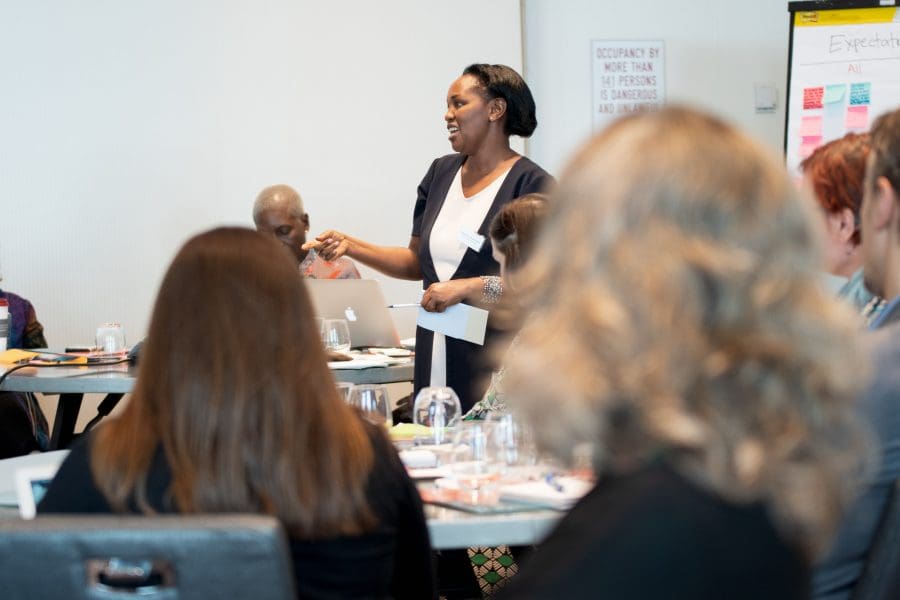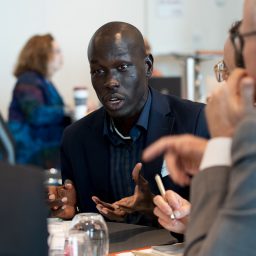What is required for a conducive space for local agency and power?
In this article, Isabella Jean from the “Stopping As Success” consortium, shares her reflections from a recent meeting on local agency and power and discusses the organizational practices that require attention in order to strengthen inclusive and locally driven peacebuilding and development processes.
During a recent consultation on Creating Conducive Space for Local Agency and Power, I spent several days with a fantastic group of people discussing this question. Some of us dared to articulate ambitious goals – to transform the international system of support to peacebuilding and to elevate local agency in peace processes.
There were seasoned local and international peacebuilders, systems thinkers, academics, researchers, retired diplomats, senior UN officials and private funders in the room. Not surprisingly conversations frequently veered into the familiar “litany of complaints” describing the current international system of support as one that continues to feature inflexible funding mechanisms and procedures, and that is often driven by externally defined notions of partnership and collaboration limited to project-specific timeframes.
So how do we change this? How do we influence a system made up of multiple actors, dynamics and incentives? Can we even talk about one “system?” We struggled with the boundaries currently drawn around the peacebuilding system and drew our own maps.


- Hope remains that change is possible. The people who attended the meeting have come from as far as Rwanda, South Sudan, Liberia, Colombia, Nepal and Sri Lanka, and others joined from UN offices a few streets away. Collectively, we have all seen many changes over the years and described how the contemporary dominant modes of behavior and thinking had emerged and ossified. We also described alternative modes of thinking and operation that can help, yet again, to shift norms, expectations and behaviors.
- Some donors remain committed to funding differently. Donors recognize that a lack of funding flexibility and the way funding relationships and accountability in the system are structured presents immense barriers to local agency, leadership and engagement. There is now mounting evidence with compelling analysis of how funding modalities and partnership choices impact the resilience and sustainability of civil society organizations and local communities. There are private funders and some bilateral donors who continue to provide direct unrestricted and programmatic funding to local organizations.
- Everyday practices have an impact. The habits, norms and narratives that people in the peacebuilding system model to others strongly impact effectiveness of peacebuilding. Those looking for the elusive “impact” are starting to realize it cannot be expected to result from “programmatically engineered processes” alone and is inextricably linked to the implicit ethical messages that we communicate through our actions. Understanding the impact of our behaviors, as well as our policies and procedures, is key to being able to challenge and change them.
- Capacity is a two-way street. “Capacity recognition” requires a conscious move away from the patronizing “capacity building” and even the less offensive “capacity development.” Stopping as Success consortium case studies demonstrate that capacity is shared more often than we seem to document. In informal conversations, international actors with years of experience in North-South partnerships readily acknowledge just how much they’ve learned and gained professionally from years of collaboration and experimentation in other people’s societies. Moreover, because South-South peer exchanges and capacity development has preceded the top-down, externally driven peacebuilding that we see today, we ought to support more such peer-to-peer exchanges as part of our commitment to build a conductive space for peace.


- We’ve become a professional sector. Autessere writes in Peaceland about “valorization of thematic expertise over local knowledge and expertise” and how outsiders assert superiority by insisting on the primacy of their professional knowledge and frameworks. This is unlikely to change soon or quickly given the growing professionalization of the sector. I personally have trained a cadre of future professionals by virtue of teaching graduate courses on peacebuilding M&E. However, the professionalization does not have to present an “either/or” choice. Currently, the power dynamics within partnerships are manifested even in low-stakes choices over preferred analytical or M&E frameworks, as well as in the more significant choices related to what constitutes “evidence and best practice” which shape strategies and programming. Are we preparing our graduate students and newly hired staff to acknowledge their power, to exercise it responsibly or to devolve it to local actors?
- Who are we hiring? Donors and INGOs continue to value staff for results-based project management skills, compliance-focused approaches to implementing peacebuilding programs and for technical knowledge. Colleagues at the meeting described examples of young professionals (from the US, Canada and Europe) with only a few years of experience, who were posted abroad in management and decision-making positions and oversight over seasoned local peacebuilding practitioners with decades of peacebuilding and development practice in their country. If we are to support conducive space for local actors to be the drivers of change and not merely the implementers of peacebuilding projects, we must place respect, dignity and validation of lived experience as well as knowledge of local languages, cultural norms and practices, and legacy of colonial and other oppression at the heart of our decisions to engage. These often requires a close look at the way human resources, senior management at HQ and leadership at the country level operate.
- Local power is not agenda-free. Do we fully understand the power dynamics within broader civil society in contexts where we are trying to make a difference? Actors with narrow self-interest are not limited to politicians – they exist in the professionalized civil society space as well. Their status and power are threatened when social movements, new forms of civic leadership and governance disrupt the status quo. The same can be said for when external actors seek to shift their support to new types of actors and institutions. Well-connected civil society or “cosmopolitan elite” (see CDA case study on peacebuilding efforts in Guatemala) have been known to influence donor and Embassy circles on questions of funding and priorities in an attempt to maintain their status as preferred advisors. It matters who we partner with, and these choices are closely scrutinized by others. As INGOs and donors review their partnerships, questions of power, legitimacy and representation should be front and center for INGOs, donors and CSOs.
My colleagues and I at the Stopping as Success consortium have recently examined case studies of responsible INGO transitions in support of locally led development and peacebuilding which echo many of the topics discussed above. In the coming months, we will be developing and sharing practical resources to support responsible transitions in the future. We plan to integrate both tangible and intangible aspects of supporting local power and agency into our guidelines and practical tools. What we produce should not be revolutionary for those who are already cognizant of power dynamics and who have always structured partnerships and transitions in inclusive and responsible ways. We’ve been lucky to meet and collaborate with such colleagues over the years, and some of them were at this recent meeting. But our experience shows they constitute an admirable minority within a larger system that remains externally driven and where power is concentrated and exercised by a few. We aim to change the balance of that. We hope you can join us!



